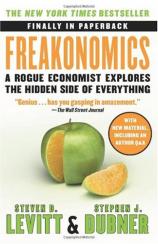Freakonomics: A Rogue Economist Explores the Hidden Side of Everything
Review
Freakonomics: A Rogue Economist Explores the Hidden Side of Everything
The authors of this wide-ranging and unconventional book seem almost proud to announce that it has no single unifying theme. It is, they proclaim in their subtitle, about "everything."
Dare a humble book reviewer suggest that they are wrong? One motif that runs consistently through their book is a disdain and skepticism about "experts" in general --- whether pollsters, real estate agents, law enforcement professionals, journalists, whomever. Steven D. Levitt and Stephen J. Dubner take gleeful pleasure in showing how these so-called experts have gotten things hugely and publicly wrong.
Levitt, a University of Chicago professor, is the researcher and number-cruncher on the team; Dubner, a practiced wordsmith, did the writing. Their book grew out of a 2003 piece by Dubner in the Sunday New York Times Magazine about Levitt's way of drawing startling unconventional conclusions from wildly diverse and seemingly irrelevant data. Featured in that story was one Paul Feldman, who gave up a secure middle-level government job to go into the commercial bagel-delivery business. From Feldman's experience, Levitt had teased out all sorts of provocative conclusions about the economy, human cupidity, and the theory of supply and demand. Paul Feldman lives. He has a whole chapter to himself in this book.
The two Steves have playfully telegraphed their intent on their book's dust jacket. It displays what appears to be an apple but turns out upon inside inspection to be an orange. Get it?
Some of the topics they cover are both interesting and important. There is a fascinating chapter on the inner financial workings of a Chicago drug distribution gang and an enlightening look inside the Ku Klux Klan. The topic, however, that is bound to arouse the most controversy is the contention that the legalization of abortion in Roe v. Wade was the single biggest reason for the sharp national crime rate decrease in the early 1990s. The authors examine other possible reasons, dismissing some as unfounded and conceding only limited effectiveness to others. Nor do they mention other possibilities; for example, the variations over both time and region in how crimes are reported --- a factor that might well have played a major role in the overall decline.
The chapter on what factors point kids toward success in school is interesting and logically presented. The conclusion is that who parents are in terms of education, social status and income level is a far more accurate predictor than what parents do for their kids. All those mothers who play Mozart and read Proust to their toddlers appear to be wasting their time.
Other topics covered in this book, however, seem merely trivial (Japanese sumo wrestling, television game shows, Internet dating), and the conclusions they reach fairly obvious. Sumo wrestlers and college professors will cheat on occasion to make themselves look good and to advance their careers. Is that surprising? Real estate agents exploit the ignorance of their clients to increase their own financial gains. So what else is new?
A lengthy chapter explores the popularity of baby names over the years by race and economic class --- only to conclude that name choices have no discernible effect on how children turn out in later life. Interesting, perhaps, but hardly important.<
Levitt and Dubner clearly enjoy their romp through "the hidden side of everything." They seldom miss a chance to point out where some expert or think tank got things wrong. They clearly have done considerable research and Dubner performed well his job of translating raw data into readable prose. They will make some people angry and charm others.
Perhaps they could someday be persuaded to investigate whether book reviewers and blurb writers have any real effect on book sales.
Reviewed by Robert Finn on January 22, 2011
Freakonomics: A Rogue Economist Explores the Hidden Side of Everything
- Publication Date: August 25, 2009
- Genres: Economics, Nonfiction, Popular Culture
- Paperback: 315 pages
- Publisher: Harper Perennial
- ISBN-10: 0060731338
- ISBN-13: 9780060731335











